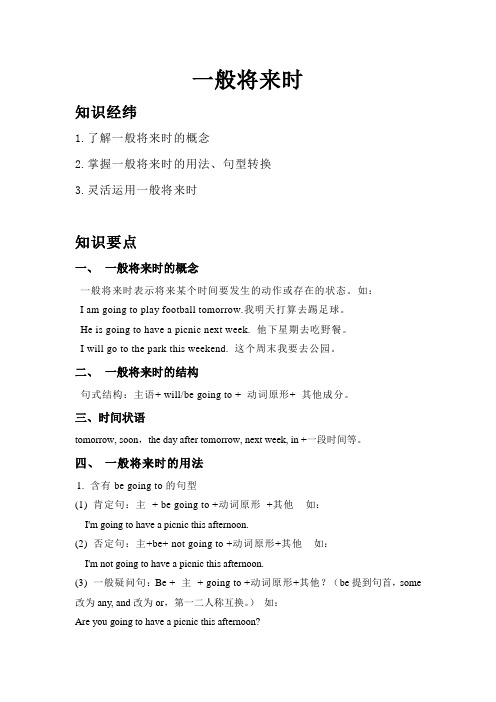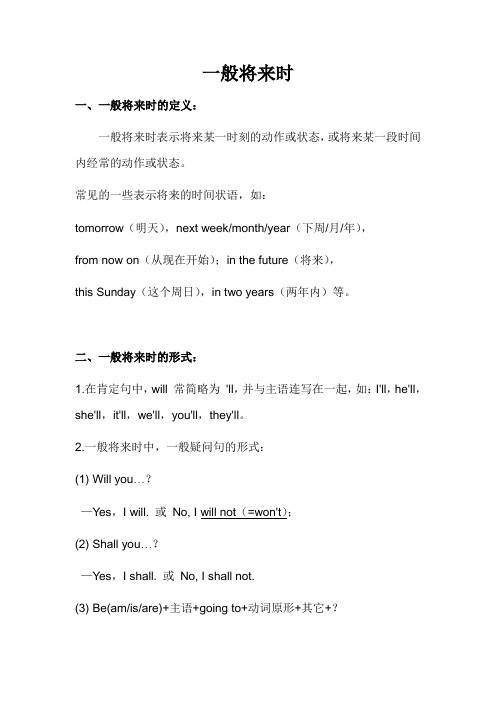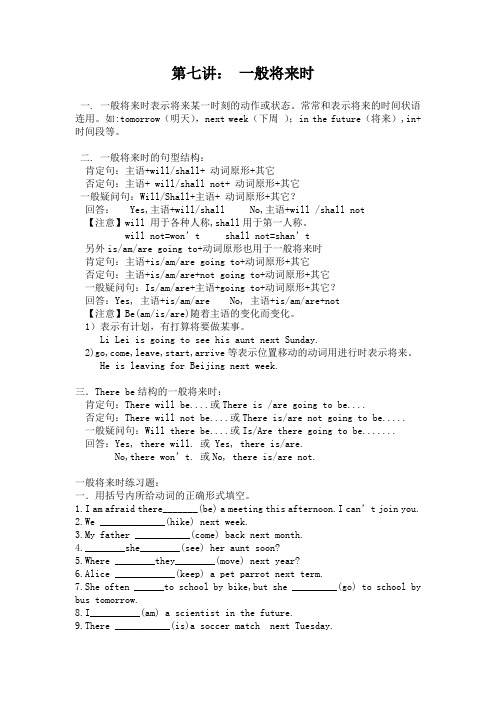一般将来时
一般将来时

一般将来时知识经纬1.了解一般将来时的概念2.掌握一般将来时的用法、句型转换3.灵活运用一般将来时知识要点一、一般将来时的概念一般将来时表示将来某个时间要发生的动作或存在的状态。
如:I am going to play football tomorrow.我明天打算去踢足球。
He is going to have a picnic next week. 他下星期去吃野餐。
I will go to the park this weekend. 这个周末我要去公园。
二、一般将来时的结构句式结构:主语+ will/be going to + 动词原形+ 其他成分。
三、时间状语tomorrow, soon,the day after tomorrow, next week, in +一段时间等。
四、一般将来时的用法1. 含有be going to的句型(1) 肯定句:主+ be going to +动词原形+其他如:I'm going to have a picnic this afternoon.(2) 否定句:主+be+ not going to +动词原形+其他如:I'm not going to have a picnic this afternoon.(3) 一般疑问句:Be + 主+ going to +动词原形+其他?(be提到句首,some 改为any, and改为or,第一二人称互换。
)如:Are you going to have a picnic this afternoon?肯定回答:Yes, I am.否定回答:No, I’m not.2. 含有will的句型(will可用于所有人称,shall只用于第一人称I和we)( 1 ) 肯定句:主+ will +动词原形+其他如:I will play football tomorrow.(2) 否定句:主+ won’t +动词原形+其他(will后加not成won't)如:I won’t play football tomorrow.(3) 一般疑问句:Will + 主+ +动词原形+其他?(will提到句首,some改为any, and改为or,第一二人称互换) 如:Will you play football tomorrow?肯定回答:Yes, I will.否定回答:No, I won’t.五、一般将来时的特殊疑问句一般情况下,一般将来时的对划线部分有三种情况。
一般将来时态

this evening
What is the mouse going to do this evening? It is going to do its homework.
will
What is she going to do? She’s going to shop/ go shopping...
They are going to dance.
will
What are they going to do this evening? They are going to watch TV.
will
句式的变化规则:
1.变否定句—---在be/will后加not 。 2.变一般疑问句------将be/will动词提前。 (主语是第一人称I 时,变一般疑问句 时将I 变you) 3.特殊疑问句(也就是对划线部分提问) -----要用特殊疑问词what +一般疑问句。
表示“不肯”、“不能”等: e.g. We asked her to be the director but she won’t agree. Oil and water won’t mix. The car won’t start.
可表示未来情况的还有:
be going to 结构 现在进行时 一般现在时 be about to 结构 be + 不定式结构
系动词am,is,are的原形都是 。 例如: 系动词 , , 的原形都是be。 例如: 的原形都是 People will have robots in their home. 人们的家中将会有机器人。 人们的家中将会有机器人。 There will be one country in the world. 世界上将会只有一个国家。 世界上将会只有一个国家。 shall适用于第一人称 ,We;而will适用于所有人称。 适用于第一人称I, ; 适用于所有人称。 适用于第一人称 适用于所有人称 通常可以用will来代替 来代替shall。 通常可以用 来代替 。 will,shall均可缩写为:'ll,如: 均可缩写为: , , 均可缩写为 I will= I'll; ; she will = she’ll;will not 和shall not分别可以 ; 分别可以 缩写为 won't 和shan't。 。
一般将来时

由于will后接动词原形, 因此在 “there be”句型一般将来时的句中 will之后用be动词的原形, 即“be”一词, 无论后面是单、复数或不可数名 词(短语)。 e.g. There won’t be any paper money.
There will only be one country.
( ) 14. If it ________ tomorrow, we’ll go rollerskating.真实条件句用于陈述语气,表示存在的情况可能发生。其 中t if 是如果的意思。 A. isn’ rain B. won’t rain 在 if引导的是条件从句,用一般现在时, 主句用将来时。 C. doesn ’t rain D. doesn’t fine 主句中一般用shall/will 表示将来,而不用be going to 表
练习题
( ) 1. There __________ a meeting tomorrow afternoon.
A. will be going to C. is going to be
B. will going to be D. will go to be
( ) 2. Charlie ________ here next month. A. isn’t working B. doesn’t working
( ) 6. Mother ________ me a nice present on my next birthday. A. will gives B. will give C. gives D.l I buy a cup of tea for you? –________. (不,不要。) A. No, you won’t. B. No, you aren’t. C. No, please don’t. D. No, please.
初中英语语法一般将来时

一般将来时一.一般将来时的定义:表示将来某一个时间将要发生的动作或存在的状态,表示将来经常或重复发生的动作。
二.一般将来时的标志:tomorrow(明天),the day after tomorrow(后天)next year(明年)next month(T—个月)next week(下一个星期)3.一般将来时的构成:1.主语^be(am,is,are)going to+动词原形+..例如:(1).I am going to play football tomorrow.明天我将要踢足球.(2).She is going to watch a movie the day after tomorrow.后天她要看一场电影.2.主语+will/shall+动词原形+.....说明:(l).will/shall有时可以和be going to互换;(2) .will是万能的,shall只能用在第一人称,主语是I,we.(3) .will和shall的后而接动词原形)例如shall/will go to Beijing next month.。
will=I11)下个月我将要去北京.(2) .You will come to see me tomorrow.(you will=you'll)明天你将要来看我.(3) .She will read English tomorrow moming.(She will=She'll)明天早上她将要读英语.四.句一般将来时的式:1.肯定句:(1) ..主语+be(am,is,are)going to+动词原形+......(2) ..主语+will/shall+动词原形+.....例句和上面一样,就不举了.2.否定句:(1)..主语+be(am,is,are)not going to+动词原形+......例如:(A):I am not going to play basketball tomorrow.明天我不将踢足球.(B).She is not/isn't going to visit Shanghai next year.明年她不将参观上海.(2)..主语+will/shall not+动词原形+.....(A).I shall not go to school the day after tomorrow o后天我不将上学了(B).I will not write my homework this evening.(will notl=I won't)今晚我不将写作业(C).She will not see a movie next week.(will not=won't)下个星期她将不看一场电影.3.一般疑问句:(A).Am/Is,Are+主语+going to+动词原形+....例如(A).—Am I going to see my grandfather tomorrow?明天我将去看我的爷爷吗?—Yes,you are.是的,你将去.(B).— Are you going to listening to the tape tomorrow?明天你将听录音带吗?—No,I am not.不,我不将.(C). —Is she going to Beijing next year? 明年我将去北京吗?-Yes,she is.是的,她将.(2).Will//shall+主语+动词原形+…例如(A). —Shall we play volleyball next class?下一节课我们将打排球吗?-Yes,you will,是的,你们将.(B). —Will you come here next week?下个星期你将来这儿吗?-Yes,I will.是的,我将.(C).--Will she teach us this term?这学期,她将教我们吗?—Yes,she will.是的,她将.4.特殊疑问句:(1).What(Where,How...)+be(am,is,are)+主语+going to+动词原形+...?例如:(A).—What are you going to do tomorrow? 明天你将要做什么?—rm going to the park? 我将要去动物园.(B).--Where are you going to swim? 你将要去哪儿游泳?—I'm going to swim in the river.(2). What(When,Where,How...)+主语+动词原形+...?例如:(A).---What will you do next week?下个星期你将要做什么?--1 will do my homeworko 我将要做作业.(B).—How will she come here tomorrow?明天她将要怎么来这儿?—She will come here by bus 。
一般将来时

一般将来时一、一般将来时的定义:一般将来时表示将来某一时刻的动作或状态,或将来某一段时间内经常的动作或状态。
常见的一些表示将来的时间状语,如:tomorrow(明天),next week/month/year(下周/月/年),from now on(从现在开始);in the future(将来),this Sunday(这个周日),in two years(两年内)等。
二、一般将来时的形式:1.在肯定句中,will 常简略为'll,并与主语连写在一起,如:I'll,he'll,she'll,it'll,we'll,you'll,they'll。
2.一般将来时中,一般疑问句的形式:(1) Will you…?—Yes,I will. 或No, I will not(=won't);(2) Shall you…?—Yes,I shall. 或No, I shall not.(3) Be(am/is/are)+主语+going to+动词原形+其它+?如:Are you going to swim tomorrow?—Yes, I am./ No, I'm not.Is he/she going to play football next weekend?—Yes, he/she is./ No, he/she isn't.Are they going to go shopping this Sunday?—yes, they are./ No, they aren't.三、一般将来时的用法:1.一般将来时由“助动词shall(用于第一人称),或者will(用于第一、二、三人称)+动词原形”构成。
这种将来意义常常夹杂着情态意义即带有说话人的主观态度和看法,比如表示“预见”。
有时也含有“意愿”或“意图”的意思。
一般将来时

第七讲:一般将来时一. 一般将来时表示将来某一时刻的动作或状态。
常常和表示将来的时间状语连用。
如:tomorrow(明天),next week(下周);in the future(将来),in+时间段等。
二. 一般将来时的句型结构:肯定句:主语+will/shall+ 动词原形+其它否定句:主语+ will/shall not+ 动词原形+其它一般疑问句:Will/Shall+主语+ 动词原形+其它?回答: Yes,主语+will/shall No,主语+will /shall not【注意】will 用于各种人称,shall用于第一人称。
will not=won’t shall not=shan’t另外is/am/are going to+动词原形也用于一般将来时肯定句:主语+is/am/are going to+动词原形+其它否定句:主语+is/am/are+not going to+动词原形+其它一般疑问句:Is/am/are+主语+going to+动词原形+其它?回答:Yes, 主语+is/am/are No, 主语+is/am/are+not【注意】Be(am/is/are)随着主语的变化而变化。
1)表示有计划,有打算将要做某事。
Li Lei is going to see his aunt next Sunday.2)go,come,leave,start,arrive等表示位置移动的动词用进行时表示将来。
He is leaving for Beijing next week.三.There be结构的一般将来时:肯定句:There will be....或There is /are going to be....否定句:There will not be....或There is/are not going to be.....一般疑问句:Will there be....或Is/Are there going to be.......回答:Yes, there will. 或 Yes, there is/are.No,there won’t. 或No, there is/are not.一般将来时练习题:一.用括号内所给动词的正确形式填空。
一般将来时
一般将来时
一般将来时:表示近期或者事先考虑过的将要发生的动作,或者是打算、将要做某件事
构成:be going to +动词原形
例:It is going to be rainy.
一般将来时的标志
含有未来的时间:tomorrow(明天)next week(下周)等
构成:be going to +动词原形+将来的时间
He is going to play football.
2.What are they going to do?
They are going to ride a bike.
3.What are you going to do?
I am going to swim.
顺口溜小记:
不久将要发生事,记住要用将来时。
be后紧跟going to,to后跟动词原形
be有形式多变化,随着主语及时变
小练笔:
1.你明天准备干什么?
2.他明天准备去拜访他的祖父母。
3.我明天打算和爸爸一起踢足球。
改错:
1.We are going to grandparents tomorrow.
2.She going to watch TV.
3.He is going to books this evening.
4.My parents is going to Beijing tomorrow.
5.John is go to the park.。
一般将来时的四种句型结构
一般将来时的四种句型结构一般将来时句型结构一般将来时用于表达未来将要发生或可能发生的动作或状态,其主要句型结构有四种:1. will + 原形动词- 主语 + will + 原形动词 + 其他成分- 例如:- I will go to the store later.(我稍后会去商店。
)- We will have a meeting tomorrow.(我们明天将开会。
)2. shall + 原形动词(疑问句或肯定句中主语为 I/we)- 主语(I/we)+ shall + 原形动词 + 其他成分- 例如:- Shall I open the window?(我打开窗户好吗?)- We shall arrive at 10:00 AM.(我们将在上午 10:00 到达。
)3. be going to + 原形动词- 主语 + be going to + 原形动词 + 其他成分- 例如:- I am going to watch a movie tonight.(我今晚要去看电影。
)- They are going to build a new house.(他们打算建造一所新房子。
)4. be + about to + 原形动词- 主语 + be about to + 原形动词 + 其他成分- 例如:- I am about to leave.(我就要走了。
)- The train is about to depart.(火车就要出发了。
)一般将来时的用途一般将来时主要用于以下几种情况:- 表达未来将要发生的肯定动作或事件- 表达未来可能发生的动作或事件- 表示计划或打算- 表达预测或推测- 表示请求或建议(使用 shall 时)- 表示承诺或保证(使用 will 时)。
一般将来时
一般将来时1.概念:一般将来时表示将来某一时刻的动作或状态,或将来某一段时间内经常的动作或状态。
或者表示计划、打算、准备做的事。
常常和表示将来的时间状语连用。
2.基本结构:a.will(第二,三人称)/hall(第一人称)+do.b.主语+i/are/amgoingtodoing+其他成分。
2.1(1)否定句:在will/hall+not+do,hallnot和willnot的缩写式分别为han't和won't.在be动词后直接加not.(2)一般疑问句:把be动词或者是will/hall提至句首即可。
3.用法:(1)一般将来时表示将要发生的动作或情况。
例如:Iwill(hall)arrivetomorrow.我明天到。
Willyoubefreetonight你今晚有空吗?Wewon’t(han’t)bebuythievening.我们今晚不忙。
(3)在以第一人称I或we作主语的问句中,一般使用助动词hall,这时或是征求对方的意见(a),或是询问一个情况(b):a.Wherehallwemeet我们在哪儿碰头?b.Shallwehaveanyclaetomorrow明天我们有课吗?在这类问句中,近年来也有不少人用will,特别是在美国。
例如:HowwillIgetthere我怎么去?(4)begoingto+动词原形a.表示计划、打算、准备做的事。
例如:Wearegoingtoputupabuildinghere.我们打算在这里盖一座楼。
Howareyougoingtopendyourholiday假期你准备怎样过?b.表示即将发生或肯定要发生的事。
例如:Ithinkitigoingtonow.我看要下雪了。
(5)用一般现在时表示将来的情况。
在主从复合句中,当主句为一般将来时时,在if,aoona,until,when等引导的状语从句中用一般现在时代替一般将来时。
如:Ifitdoen’trainthiafternoon,we’llhaveaf ootballmatch.如果今天下午不下雨,我们将进行一场足球比赛。
一般将来时讲解(附习题+答案)
一般将来时讲解(附习题+答案)一、一般将来时的含义:表示动作发生在将来二、一般将来时的句型:(1) will/shall+动词原形(2) be going to+动词原形三、一般将来时的时间状语:tomorrow(明天)、the day after tomorrow(后天)、next...(下一...): next week(下一周)、next year(明年)、next month(下个月)in+一段时间(...之后): in three days(三天之后)、in the future在未来this evening(今天晚上)四、一般将来时的句型结构:(1) will/shall+动词原形(will not =won’t)(will 各种人称均可用,shall 只能用于第一人称)1)肯定句:主语+will/shall+动词原型...如:I will go to school tomorrow.我明天将会去学校He will go to school tomorrow.他明天将会去学校。
2)否定句:主语+will/shall+not+动词原型...如:I won’t go to school tomorrow.我明天将不会去学校。
He won’t go to school tomorrow.他明天将不会去学校。
3)一般疑问句:Will/Shall +主语+动词原型...如:Will you go to school tomorrow?你明天要去学校吗?Will he go to school tomorrow?他明天要去学校吗?肯定回答:Yes, 主语+will.如:Yes, I will.Yes, he will.否定回答:No,主语+will+not.如:No, I won’t.No, he won’t.4) 特殊疑问句:特殊疑问词+will/shall+主语+动词原型...如:What will you do tomorrow?你明天将会做什么?What will he do tomorrow?他明天将会做什么?(2) be going to+动词原形1)肯定句:主语+be going to +动词原型...如:I am going to buy some books tomorrow.我明天打算去买一些书。
- 1、下载文档前请自行甄别文档内容的完整性,平台不提供额外的编辑、内容补充、找答案等附加服务。
- 2、"仅部分预览"的文档,不可在线预览部分如存在完整性等问题,可反馈申请退款(可完整预览的文档不适用该条件!)。
- 3、如文档侵犯您的权益,请联系客服反馈,我们会尽快为您处理(人工客服工作时间:9:00-18:30)。
第四讲一般将来时一.定义:表示在将来某时刻将要发生的动作或存在的状态。
常与表示将来的时间状语连用:二.标志词:①tomorrow, tomorrow morning, the day after tomorrow②next(下一个)+时间段next week, next week, next year,③in+时间段(……以后)in a month 一个月后, in two days 两天之后④时间段+later(……以后)a month later一个月后, two days later两天之后⑤固定搭配:from now on 从今往后, from this moment 从这一刻起, in the future 将来等eg : ① I will be good at English in the future. 今后我会学好英语课。
② I’m going to work hard at Maths from now on .从现在起我会好好学习数学的。
③ He will be back from London in a month. 一个月后他就从伦敦回来了。
④ Where are you going to spend your weekend? 你打算去哪儿度过你的周末?三.句型结构:(一)一般将来时肯定句分两种形式。
1. 主语﹢shall / will + 动词原形﹢其它﹢将来时间。
第一人称单/ 复数+ shall + 动词原形。
各人称单/ 复数+ will + 动词原形。
eg : I / we shall meet at 6:00 tomorrow.I / We / You / She / He will look after the child next week .It will rain tomorrow . 明天下雨。
以shall / will + 动词原形为谓语动词的一般将来时, 表示临时的,即兴的在将来某一时刻将要发生的动作或存在的状态。
eg : ① He will come to see you the day after tomorrow . 后天他将来看你。
② I’ll visit my teacher after class . 放学后我要去拜访我的老师。
③ We shall have an English party next Saturday . 我们下周六将举行一次英语聚会。
④ We will finish this work tomorrow . 明天我们将会完成这项工作。
练一练:Ⅰ. 请在下列各题空格处填入will / shall。
① You not drive through a red light .② I do everything for her .③ Let’s go and take a wa lk after dinner . we ?Ⅱ. 判断正误并改正错误之处。
① You will saw many birds in the sky ( )② Shall she go to the park ? ( )③ I go swimming tomorrow . ( )④ She shall go to Tianjing next month. ( )2. 主语﹢be going to + 动词原形﹢其它﹢将来时间。
根据各句子主语的具体情况, 使用be going to + 动词原形。
eg : I’m going to go shopping this afternoon .You are going to finish your homework .以be going to + 动词原形为谓语动词的一般将来时, 通常表示打算,准备做某事或即将发生的、肯定要发生的事。
eg : ① He is going to write a book on Chinese culture. 他打算写一本关于中国文化方面的书。
② I’m going to leave for Beijing this summer holiday. 这个暑假我将去北京玩。
③ He is going to learn Japanese next year. 他准备明年学日语。
④ John is not going to join the party tonight. John今天晚上不去参加那个晚会了。
练一练:He / She (be) going to go to the park by bus .We / They are going to (watch) TV after 2:00.(二)一般将来时的否定句:1. 主语﹢won’t ∕shan’t﹢动词原形﹢其它﹢将来时间。
eg : ① He will not come to see you the day after tomorrow .② It won’t rain tomorrow .③ We shan’t have an English pa rty next Saturday .练一练:④ You will see many pictures on my desk.⑤ I shall go for a walk after class.2. 主语﹢be not ﹢going to ﹢动词原形﹢其它﹢将来时间。
① They aren’t going to watch TV after 2:00.② I am not going to work hard at Maths from now on .练一练:③ You are going to leave for Beijing this summer holiday.④ They are going to have a meeting after 3 days.(三)一般将来时的疑问句:1. Will ∕Shall ﹢主语﹢动词原形﹢其它﹢将来时间?肯定回答:Yes, 主语﹢will ∕ shall.否定回答: No, 主语﹢won’t ∕shan’t.① He will come to see you the day after tomorrow .Will he come to see you the day after tomorrow ?Yes, he will. No, he won’t.② Robots will do everything one day.Will robots do everything one day?Yes, they will. No, they won’t.③ We shall have an English party next Saturday.Shall we have an English party next Saturday?Yes, we shall. No, we shan’t.练一练:④ You will see many pictures on my desk.⑤ They will go for a walk after class.2. Be﹢主语﹢going to﹢动词原形﹢其它﹢将来时间?肯定回答:Yes, 主语﹢be.否定回答:No, 主语﹢be not.① Are you going to leave for Beijing this summer holiday?Yes, I am. No, I am not.② Is he going to learn Japanese next year.? Yes, he is. No, he isn’t. 练一练:John is going to join the party tonight.Ⅰ. 用动词的适当形式填空。
1. Mary (visit) her grandparents tomorrow .2. Lin Tao (play) the piano yesterday .3. He (show) me his photo next Monday .4. I (like) cleaning my room every day .5. The kite (fly) in the sky now .6. He (arrive) at Xi’an 2 minutes ago .7. You (be) the best students in your class in the future. Ⅱ. 按要求改写成相应的句子。
① I am an English teacher.1. (一般过去时)2. (一般将来时)3. (否定句)4. (疑问句)② He reads a book.1. (一般过去时)2. (一般将来时)3. (否定句)4. (疑问句)③ They are my good friends .1. (一般过去时)2. (一般将来时)3. (否定句)4. (疑问句)Ⅲ. 根据中文提示完成句子。
1.我打算明天和朋友去野餐。
I _____ ______ ______ have a picnic with my friends tomorrow.2.下个星期天你打算干什么?What ______ _____ ______ ________ _______ next Sunday ?3.你明天去游泳吗?______ you ______ _______ tomorrow?4.下课后她打算听音乐。
She ______ ______ ______ listen to the music after class.5.明天9:30我们在车站见面。
We ______ meet at the bus stop at 9:30 tomorrow mo rning.。
